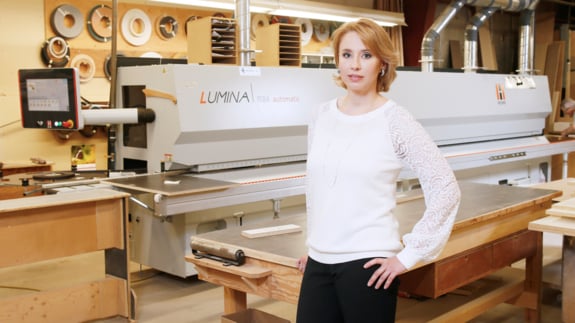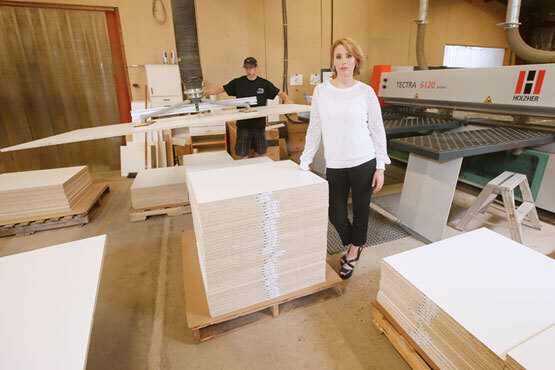A transition in translation: Buying a business as a new immigrant

When Natalya Osmankina arrived in Winnipeg in 2015, she could only say five words in English: “Hello, my name is Natalya.”
Since then, she has not only purchased a company, but has also managed to grow the business and adapted to life in a new country, all while raising three young children.
Her and her husband Michael’s experience as immigrant entrepreneurs inspires. It’s also a story that she describes with equal doses of humour and gratitude.
“People ask me: Why Winnipeg? It’s so cold; it’s Winterpeg,” Osmankina says with a laugh. “There’s actually a simple answer for that: We wanted to see better opportunities for our kids, for their education and better business opportunities for us. It’s the dream of our life.”
The Russian-speaking couple have made great strides establishing themselves in their new country.
Less than a year after arriving from Kazakhstan, a former Soviet republic, Osmankina purchased Western Millwork Ltd., a producer of high-quality architectural millwork for new commercial, industrial and residential construction projects as well as restorations and renovations. Sales have grown 20% since the change of ownership and the company now employs 34 people.
A plan years in the making
This result didn’t happen overnight. In fact, the move to Canada took years to prepare.
Back in Central Asia, the couple owned various residential and commercial properties and ran a construction company. But unlike many construction entrepreneurs who act as project managers while subcontracting tradespeople, they had their own skilled crew.
Kazakhstan’s main building materials are concrete and brick, but lumber was also a key component of their work. Osmankina says it’s a material that’s close to her heart; her grandfather was a lifelong millworker.
The couple connected with a broker as well as a location specialist to help them find a suitable business in Canada, one that was neither too big nor too small.
Their familiarity with wood products and the construction industry probably closed the deal to buy Western Millwork, Osmankina says. “If you belong in the construction business, don’t buy a food business. If you belong in the food business, don’t ever buy in construction. You have to have the vision for how you’re going to run the company.”
Their broker connected them with BDC to secure financing to purchase the business.
A growing wave of business transitions
It’s the type of transition story that could become increasingly common as more and more Canadian entrepreneurs get ready to exit their business. A 2017 study by BDC found that 41% of entrepreneurs expect to exit their business without acquiring another in the next five years. Of those business owners, 83% say they plan to retire.
Osmankina and her husband took the right steps to ensure a smooth transition. For one thing, she says the whole process of finding a suitable venture, resettling the family (including buying a French bulldog named Marcel for the kids) and then taking over the company was one that they couldn’t—and didn’t want to—rush.
“It took us three years to sell everything,” she says of their homeland assets and businesses. “I brought financial references and accreditations from Kazakhstan. It really helped answer any questions about how I could develop the business here.”
They’ve also invested in new, highly efficient machinery to boost production speed. And they’ve hired additional sales and engineering department staff—as well as two new estimators and an IT expert who created a new website; something the company never had before.
Going digital
The couple is now in the midst of a digital transformation, converting Western Millwork’s former paper-driven processes into digital systems. This has involved bringing in new software for everything, from e-commerce to online communication; clients were still paying by cheque prior to the ownership change.
For Osmankina, this shift to computerized systems has been an accomplishment in itself; she admits that her greatest weakness is an aversion to computers. Rather, she prefers to write things down with a pencil and to speak with people face-to-face. “I hate computers,” she says. “But technology is how our clients prefer to work and I knew it was important for our company to move in that direction.”
The couple also started making sales beyond Canada’s borders. And they continue to benefit from Western Millwork’s longstanding membership with the Architectural Woodwork Manufacturers Association of Canada (AWMAC). AWMAC members have a reputation for high quality standards and are often invited or prequalified for certain projects.
Taking care of employees
The well-being of those around her is another priority for Osmankina. She has a profit-sharing plan with key employees and makes a point of maintaining a positive workplace environment, connecting front-office and production staff through fun events like pizza day and employee appreciation barbecues.
She’s also careful to respect the Canadian style of doing business. “It’s a different culture, different people, different rules here, she says. “I try to understand the people and what they want. It’s really important that you listen to people.”
“We’re still learning, but my crew is amazing,” she says. “My goal is that everybody around me will be happy.”

Lessons learned: Four tips to ensure a smooth transition when buying a business
1. Avoid focusing solely on financial gains at the outset
Osmankina says entrepreneurs shouldn’t try to make a fortune in the first few years after taking over a new business. “Pay for everything, pay a salary for yourself, and be happy. People who try to earn a lot of money in the first couple of years will be bankrupt, 100% of the time.”
2. Be a leader, not a boss
Understanding that you are part of a team is one of the keys to success, Osmankina says. Leaders who believe they are on top and their employees are below them won’t do well when taking ownership of a company.
“Believe in yourself, but don’t be so proud that you think you can do everything without your employees,” she says.
There’s no way you can succeed if you believe the world revolves around you.
3. Leave no leaf unturned
Entrepreneurs looking to buy a business should go through every document they can find and ask a lot of questions. Start with the most basic: Why is the current owner selling? Is there a hidden problem or is the industry headed for a cliff? Is the company overly dependent on a few customers or suppliers?
“Be sure that you check everything,” Osmankina says. “Financial statements, production records, lease agreements, actual work in progress, equipment… Everything.”
4. Retain key staff members
For Osmankina, one of the keys to successfully buying a business is to retain the best employees and avoid losing them to competitors.
“Without them, it can be really hard. We are so thankful for the people who were here when we started; they were so helpful.”